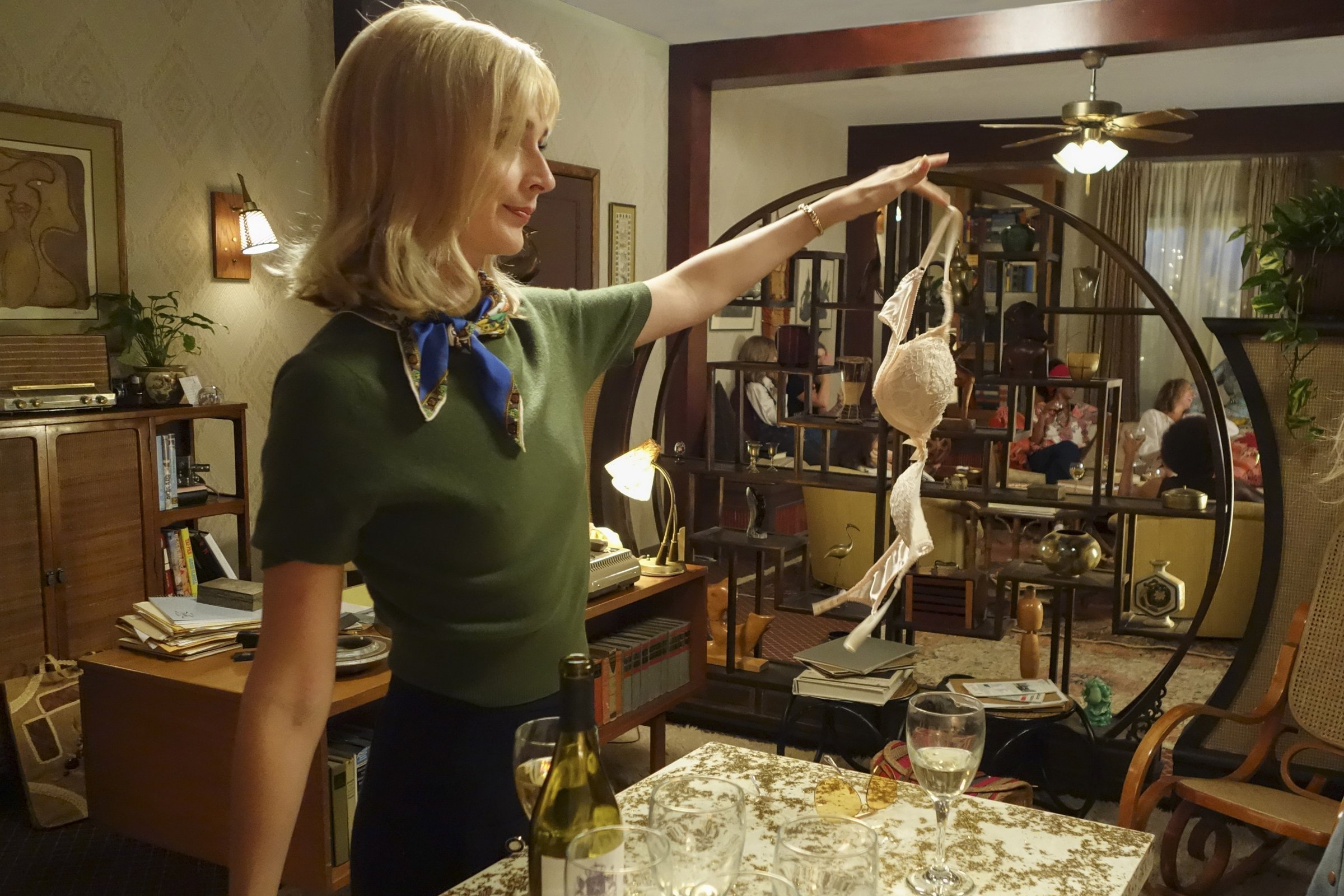
Warning: This piece contains spoilers for Masters of Sex
While Miss Arkansas Savvy Shields happily danced her way to the 2017 “Miss America” title in Atlantic City, N.J., on Sunday night, a flashback to the 1968 pageant overshadowed by protests was airing on Showtime.
The Season 4 premiere of Masters of Sex opened with renowned sex researcher Virginia Johnson (Lizzy Caplan) watching televised footage of women chanting “no more bras” and stuffing the undergarments, which a voice on screen describes as “hideous symbol of patriarchal oppression,” into a “Freedom Trash Can.”
That dramatic episode really did occur on Sept. 7, 1968, when nearly 400 protesters picketed the event. As TIME described the scene in a Sept. 13, 1968 article:
“No more Miss America!” announced the flyer from the Women’s Liberation Force. The protest came from a group of angry ladies led by Robin Morgan, 27, poetess and housewife. As the Liberators see it, Miss America represents “racism with roses”; she is a “military death mascot” symbolizing “the living bra and the dead soldier.” What’s more, this “mindless boob girlie symbol” represents the “pop-culture obsolescent theme of spindle, mutilate and discard tomorrow.” As the contest went on in Atlantic City’s Convention Hall, the protesters outside rallied around a “Freedom Trash Can” into which they urged all good women to toss “bras, girdles, curlers, false eyelashes, wigs and representative issues of Cosmopolitan, Ladies’ Home Journal and Family Circle.”
The women never set fire to the waste bin because “starting a fire on the boardwalk was illegal,” but the protest is known for fueling “the association of feminists as ‘bra-burners,'” as Jennifer Lee, director of Feminist: Stories from Women’s Liberation, wrote in 2014.
Get your history fix in one place: sign up for the weekly TIME History newsletter
That volatile moment in the history of feminism was a point of reference throughout the show’s season premiere.
Masters’ wife Libby (Elisabeth Ellis in real life, played by Caitlin FitzGerald) is referred to a “women’s group” run by one of her lawyer’s former clients — a woman who some viewers have noted looks like a young Gloria Steinem. The group encourages women to air their grievances and views of current events. At the group, Libby dismisses the Miss America protest as “silly” and “useless,” until the leader asks her why she’s so attached to a “breast restraint that’s become a multi-billion dollar industry owned and operated by men.”

TIME’s August 31, 1970, cover story described meetings like the one Masters attended as the “heart” of the Women’s Liberation Movement. Such meetings promoted a “common awareness of problems” throughout the 1960s. As the magazine explained:
the heart of the movement is made up of hundreds of “rap groups,” usually formed on an ad hoc basis. “Consciousness raising” is their aim: the establishment of a common understanding of the problems that women face in a male-dominated society. The usual group meets one night a week, numbers eight to twelve women, and concentrates on topics such as attitudes toward work, marriage, families, feminist history and woman’s role in society. Again and again, phrases like this are heard: “I was desperate when I came to Women’s Lib … I always thought there had to be something wrong with me because I wasn’t exclusively interested in a life of suburban luxury . . . The first night I came to a rap group I had this suddenly close feeling because I found out other people had the same feelings about gut issues that I did.” Adds another: “It’s not just you alone fighting your mother and father and all those engagement announcements she sends every week” (the message is all too clear —why isn’t she getting married?).
For a show all about how Masters and Johnson seemed like the only ones talking about the real science behind sex, it’s already clear that Season 4 will take place in a period of history when social movements empowered people to talk about sex, among other topics once considered taboo.
More Must-Reads From TIME
- The 100 Most Influential People of 2024
- Coco Gauff Is Playing for Herself Now
- Scenes From Pro-Palestinian Encampments Across U.S. Universities
- 6 Compliments That Land Every Time
- If You're Dating Right Now , You're Brave: Column
- The AI That Could Heal a Divided Internet
- Fallout Is a Brilliant Model for the Future of Video Game Adaptations
- Want Weekly Recs on What to Watch, Read, and More? Sign Up for Worth Your Time
Write to Olivia B. Waxman at olivia.waxman@time.com